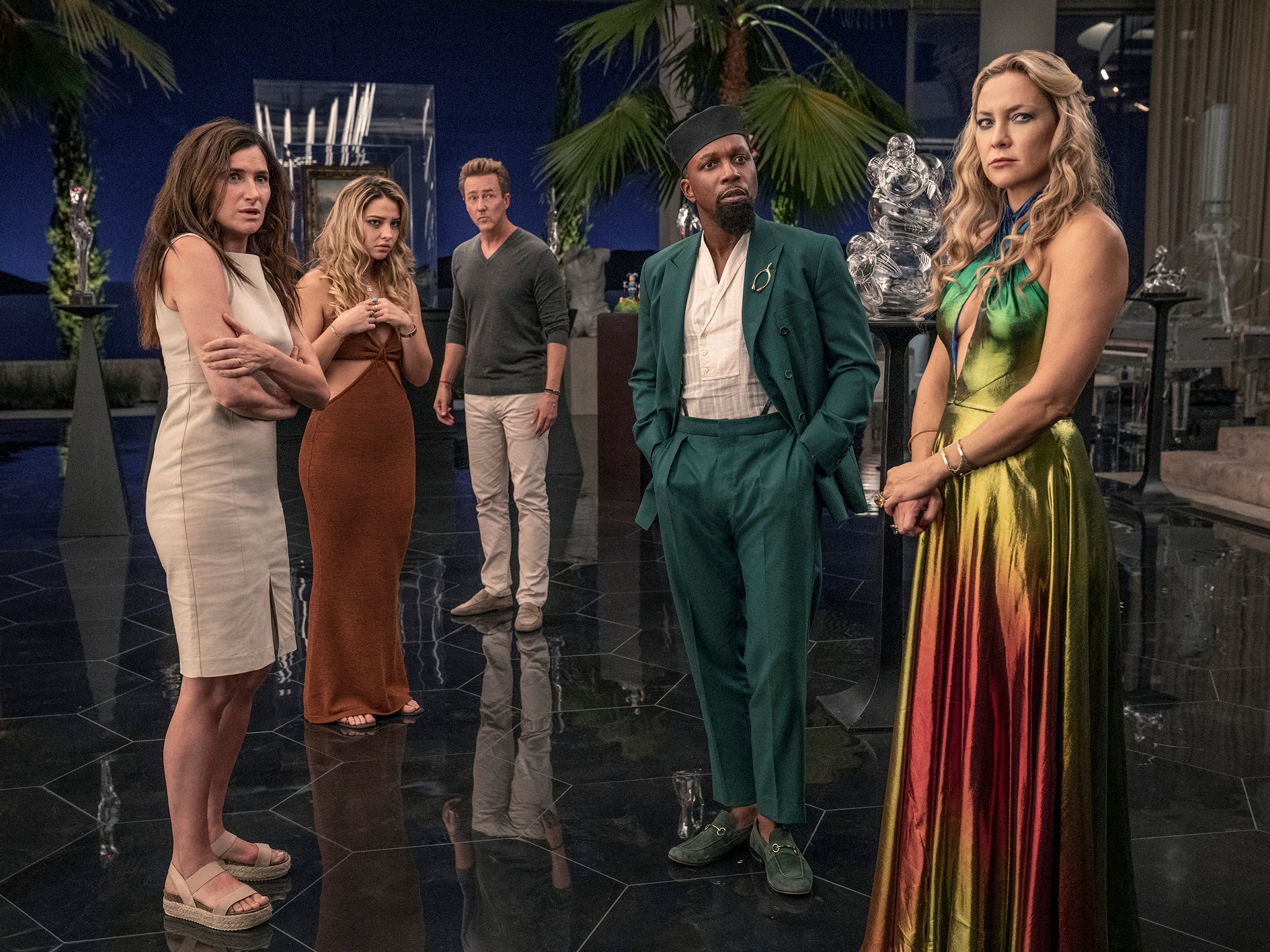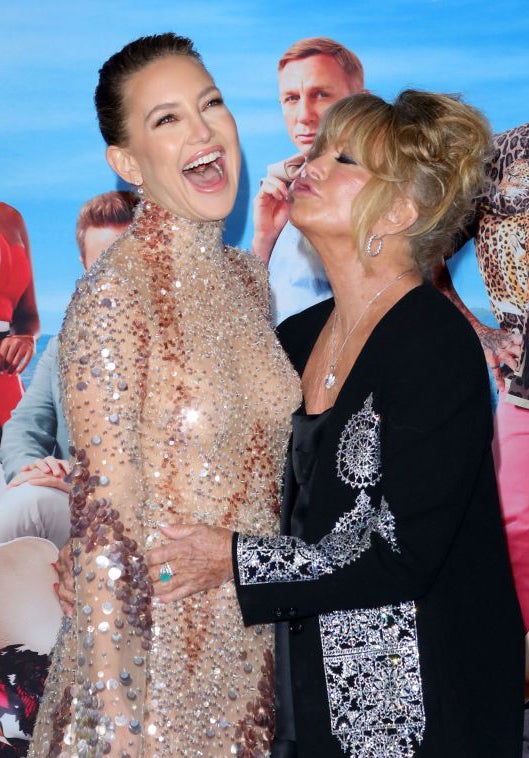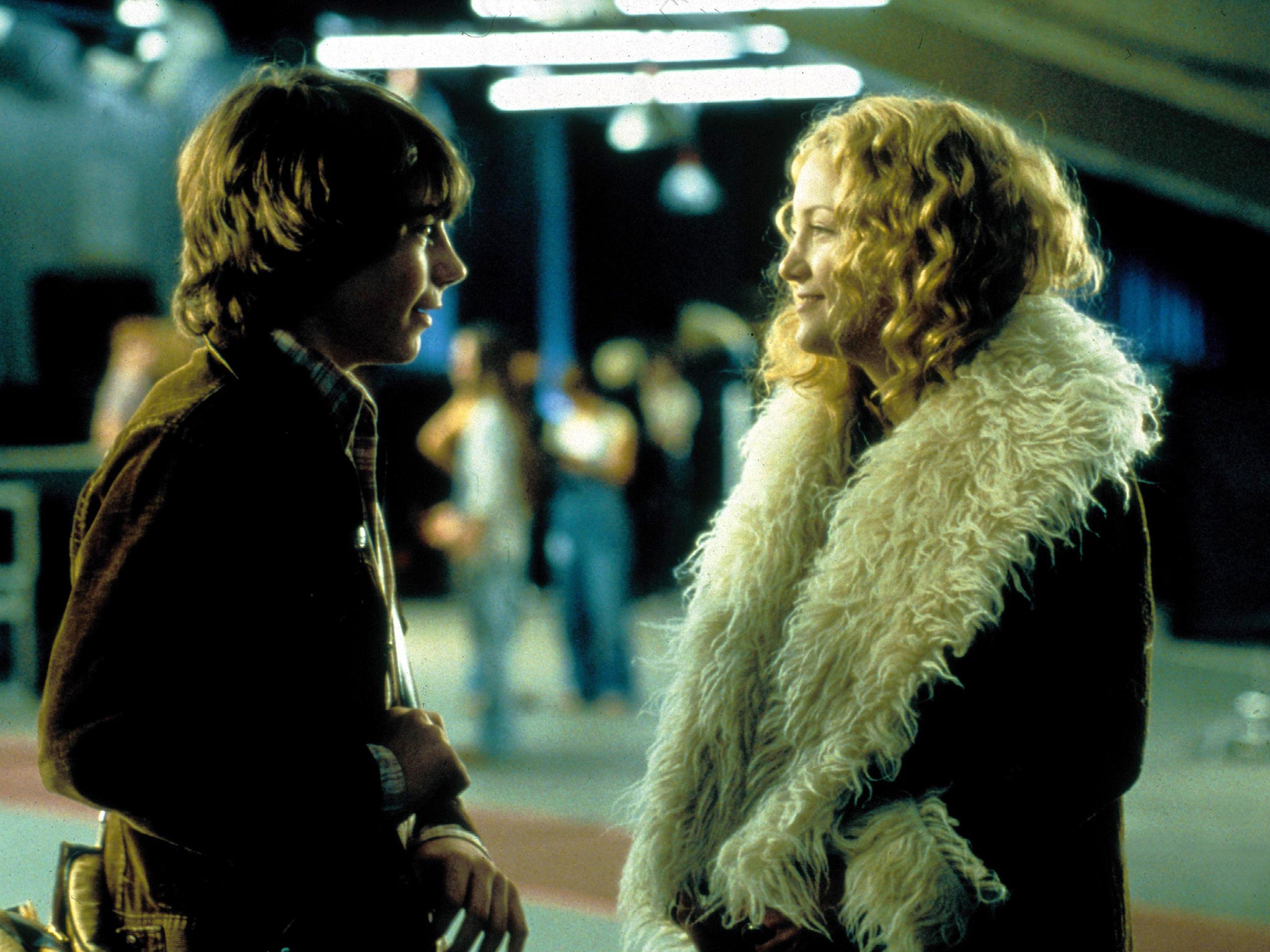‘I’ve not led a very traditional life’: Kate Hudson on Glass Onion, cancel culture and being a nepo baby
The ‘Almost Famous’ star talks to Adam White about her return to movies in the ‘Knives Out’ sequel

![‘I feel more confident, I don’t feel as raw. If [my work] is rejected, I’m not gonna die’](https://static.independent.co.uk/2023/09/14/14/20221016_GB_KNIVES_OUT_2_KATE_HUDSON_00626_R.jpg)
Your support helps us to tell the story
From reproductive rights to climate change to Big Tech, The Independent is on the ground when the story is developing. Whether it's investigating the financials of Elon Musk's pro-Trump PAC or producing our latest documentary, 'The A Word', which shines a light on the American women fighting for reproductive rights, we know how important it is to parse out the facts from the messaging.
At such a critical moment in US history, we need reporters on the ground. Your donation allows us to keep sending journalists to speak to both sides of the story.
The Independent is trusted by Americans across the entire political spectrum. And unlike many other quality news outlets, we choose not to lock Americans out of our reporting and analysis with paywalls. We believe quality journalism should be available to everyone, paid for by those who can afford it.
Your support makes all the difference.On a balmy autumn morning in September 1999, Kate Hudson felt different. She tried to put it into words in her diary. She’s always “journaled”, once telling an interviewer that it keeps her “centred”, which is a very Kate Hudson thing to say. She was in the middle of shooting Almost Famous – the shaggy coming-of-age story that ignited her career and earned her an Oscar nomination – and had woken up after a night of filming on a cramped tour bus. “I walked outside the hotel and said hello to the light coming up over the hill,” she wrote. “I feel extremely emotional today. My heart is constantly aching. I don’t know why. It’s not that I’m missing anything; it’s that I’m feeling everything, and my heart’s accepting it.”
Hudson recounted this journal entry to her Almost Famous director Cameron Crowe in an interview in 2000, and now I’m recounting it to Hudson in a London hotel room 22 years later. She blushes, biting a fingernail at the memory, as if one of her parents had just pulled out an embarrassing photo album. “Oh, that’s meeee,” the 43-year-old laughs. “That’s me in life. Just feeling everything. When I was younger, that part of me didn’t have as much control. I didn’t understand it. As I’ve gotten older, I’ve learned how to manage that kind of rawness. But I still love feeling that way. That’s why I’m an actor! I mean, come on...”
Hudson is huddled in the corner of a sofa in navy blue trousers and a matching top with flared sleeves. She looks characteristically serene and sun-kissed, her hair in long, beachy waves. There’s an urban legend among interviewers that claims your subject is more likely to open up to you if you mirror their body language – I have no idea if this is true. But within a few minutes of trying to emulate Hudson, I realise I look slightly insane. She’s always moving. On the sofa. Off the sofa. Hands pulled up into her sleeves. Hands through her hair. Feet on the table. Feet curled up under her. I call it a day.
People love Kate Hudson. Men. Women. Whoever. She’s equal-opportunity crush material: a symbol of airy, cultured bonhomie. I ponder out loud whether the adoration might be a side effect of her romcoms, but she’s not sure. How to Lose a Guy in 10 Days and Raising Helen did, though, cement her as a kind of metropolitan, mid-Noughties dream girl. Then again, there’s also Almost Famous, in which she plays rock-star muse Penny Lane – a character so luminous that you’d happily follow her to whatever dingy music venue she felt drawn to. You’d at least want to hang out with her as she shopped for fur-lined jackets. Hudson concedes that those parts may have aided the love-ins she inspires. But she also thinks people gravitate towards her because she’s “imperfect”.
“I’ve not led a very traditional life, you know?” she says. “Maybe that resonates? Women do come up to me and talk to me about their personal lives a lot. I think because I’ve always been really open and honest about everything. I could never be phoney about it. It’d be exhausting.” She has a point. Hudson has been open about her and her brother Oliver’s estrangement from their birth father, the musician Bill Hudson – they were more or less raised by Kurt Russell, who’s been with their mother Goldie Hawn since Kate was three years old. She’s been open about her experiences as a mother and a co-parent. She has three children between the ages of four and 18, with musicians Chris Robinson (of The Black Crowes), Matt Bellamy (of Muse), and folk rocker Danny Fujikawa, to whom she got engaged last year. She’s always seemed to march to her own beat.
When her first son Ryder was born in 2004, Hudson vowed to stay sane amid the voyeuristic media coverage of the time. “I felt like I was living in a fishbowl,” she remembers. “It was a moment in my life where I could either let magazines and tabloids give me a ton of anxiety and make me hide, or I could just say ‘F*** it.’ I chose not to worry about how people interpret me, or what’s being said in the press, or how I’m going to be reworded.” She rests her hand near the dictaphone between us. “Not that you’re going to reword, but you know what I mean.”
I remember Cameron Crowe saying that it wasn’t as if Goldie Hawn and Kurt Russell held a gun to his head and made him put me in ‘Almost Famous’
We’re here to talk about Glass Onion, the sharp and flashy sequel to Knives Out that’s streaming now on Netflix. I spent a lot of the film realising how much I’ve missed Hudson: Glass Onion marks her most high-profile acting role since at least 2016. That’s when her various side-hustles (vodka, health supplements, podcasting, athleisure) became her main focus, with acting taking more of a back seat. In that time, it was easy to forget not only how good she is on screen, but also how much we missed the kind of film she always used to star in – those glossy, big-city comedies, those expensive studio movies for grown-ups, like her swampy voodoo chiller The Skeleton Key.
Glass Onion is part of a franchise, sure, but it hits the same pleasure centres as Hudson’s early star vehicles. It’s ludicrously agreeable – an uber-expensive comedy-cum-mystery packed with gags, set pieces and celebrity cameos. Everyone with a Netflix subscription will be watching it this Christmas. And unlike the platform’s star-studded Christmas movie last year, Don’t Look Up, it won’t make you hate yourself right after. “I love making movies that make people feel good,” Hudson tells me. “What a great thing if something I do makes someone feel...” She hovers over the right word, “...fuzzy!” She seems to tingle in her seat, before laughing so widely and earnestly that it sounds like someone saying “Wow”. It reminds me of her mother.
Hudson plays Birdie Jay, a one-time It-girl turned perpetual controversy magnet. She is, like most Knives Out characters who aren’t Daniel Craig’s central detective Benoit Blanc, completely terrible. Ethnic slurs burst forth from her mouth like spittle in an argument. Her Covid mask is riddled with designer holes. She once dressed up as Beyoncé for Halloween, and you can imagine how that went. Get stuck in a lift with her and you’d beg for it to plummet. Invited by dastardly billionaire Miles Bron (Edward Norton) to his private island – alongside a rogues’ gallery of potential murderers that include Janelle Monáe’s wronged businesswoman and a men’s rights YouTuber played by Dave Bautista – Birdie finds herself entangled in an elaborate conspiracy. Soon there are accusations and arguments. Poisonings and power-plays. Back-stabbing and bodies. “Talk about the most delicious meal,” Hudson says.

Watch Apple TV+ free for 7 days
New subscribers only. £8.99/mo. after free trial. Plan auto-renews until cancelled

Watch Apple TV+ free for 7 days
New subscribers only. £8.99/mo. after free trial. Plan auto-renews until cancelled
Writer-director Rian Johnson pulls at numerous real-world threads in Glass Onion, from elitism and political corruption to the kind of opaque, masturbatory big-tech futurism that smells undeniably Musky. As for Birdie, she complains about being endlessly “cancelled”, yet never seems to actually be punished for it – she’s still very rich, very connected, and very indifferent to the harm she causes. What does Hudson think of “cancellation”?
“People should just have a deeper awareness, right?” she says. “And people who don’t are being called out. We should hold people accountable who do anything that’s sexist, misogynistic, or racist. We should call out the lack of diversity in companies. Or the lack of women on boards. Kanye should be held accountable for his behaviour. Period.” We’re speaking a few days after West’s “White Lives Matter” T-shirt stunt at Paris Fashion Week, but before he started praising Hitler. “There are clear things that [warrant], you know, ‘You’re cancelled, bye!’”

She has a lot more empathy, though, for younger people. “If you’re over 40, there’s a line,” she says. “Where it gets challenging is when it swings too far in the other direction. I don’t want kids to be scared to make art, or to say things. They need to take risks and speak their minds, because what they want to say could actually be really powerful. You can’t just cancel someone because they’ve made a little mistake. My only thing with ‘cancel culture’ is that it scares the younger generation. They don’t know if what they’re about to say is going to be met negatively or positively, so they just choose to not say anything. I think we can make a little bit of room for the younger generation to find their way.”
Hudson returns often to the subject of children, be they her own or other people’s. It’s something she has in common with her mother, who largely left acting behind in 2002 to focus on educational programmes for youngsters. Of all of Hollywood’s famous mothers and daughters, Hawn and Hudson seem the most immediately similar. They’re both irrepressibly sunny, gifted at comedy and drama, and oddly comforting on screen; the human equivalent of chicken soup when you’re ill. They’re also incredibly close: Hudson and Fujikawa live on the same street in Los Angeles as Hawn and Russell, and Hudson regularly attends events and premieres with her mother on her arm. But Hudson says she wasn’t always as vocal about her famous parents as she is now.
“When I was starting out, if anybody asked me about them, I’d always try and change the subject,” she says. “I really wanted to have my own career. Once I was a good decade in, though, I realised it just didn’t matter. Sometimes talking about my parents was actually a great distraction from talking about the movie I was meant to be promoting.” She grimaces. An image of the Bride Wars poster – of Hudson and Anne Hathaway threatening each other with wedding-cake slicers – flashes before my eyes.

She says that she felt insecure about her family when, as a teenager, she decided to be an actor, and then began auditioning for roles at 16. “There was a lot more criticism,” she recalls. “I really felt like I had to know my s***, and be as prepared as I could be. It felt like I had to live up to something.” But she admits that there seemed to be a lot less “son-or-daughter-ofs” back then. It meant a more glaring spotlight was placed on her. “It was me, maybe Gwyneth... I just felt so lucky to get parts. I think a lot of directors and producers didn’t want to hire me because they didn’t want [my parents] to become what the movie was about.” She definitely didn’t feel as if her parents helped her get work eventually, either. “I remember Cameron Crowe saying that it wasn’t as if Goldie Hawn and Kurt Russell showed up to his door with, like, trench coats on, holding a gun to his head and making him put me in the movie. That’s not how any of this works.”
I ask if Hudson has been following the discourse around “nepotism babies” – a term used to describe the vast flock of newly famous celebrities descended from establishment stars, among them Lily-Rose Depp, John David Washington and Maya Hawke. Just this week, New York Magazine dubbed 2022 “The Year of the Nepo Baby”. Hudson sighs. “The nepotism thing, I mean... I don’t really care. I look at my kids and we’re a storytelling family. It’s definitely in our blood. People can call it whatever they want, but it’s not going to change it. I actually think there are other industries where it’s [more common]. Maybe modelling? I see it in business way more than I see it in Hollywood. Sometimes I’ve been in business meetings where I’m like, wait, whose child is this? Like, this person knows nothing!” For Hudson, it’s pretty simple. “I don’t care where you come from, or what your relationship to the business is – if you work hard and you kill it, it doesn’t matter.”

Hudson says she’s less anxious than she used to be, more willing to take risks. Next year, for instance, she’ll be releasing an album. Her vocal talent isn’t surprising – she was one of the few bright spots in the Daniel Day-Lewis musical misfire Nine, for instance. But it is surprising to learn that fear was holding her back from releasing anything until now.
“I feel more confident, I don’t feel as raw,” she says. “If it’s rejected, I’m not gonna die. Ten years ago? Five? I’d have felt devastated if I put it out and it wasn’t received warmly. But now I feel stronger.” What changed? “Oh, just age,” she laughs. “Look, in this industry you get very comfortable with rejection. With criticism. After a while you can choose to retreat, or it kind of calluses over.”
She says she’s the same as she was at 19 years old and saying hello to the sunrise on the Almost Famous set – just less confused about herself. Less easily bruised. “I still feel it all. Only now it doesn’t have the same sting.”
‘Glass Onion: A Knives Out Mystery’ is streaming on Netflix now



Join our commenting forum
Join thought-provoking conversations, follow other Independent readers and see their replies
Comments